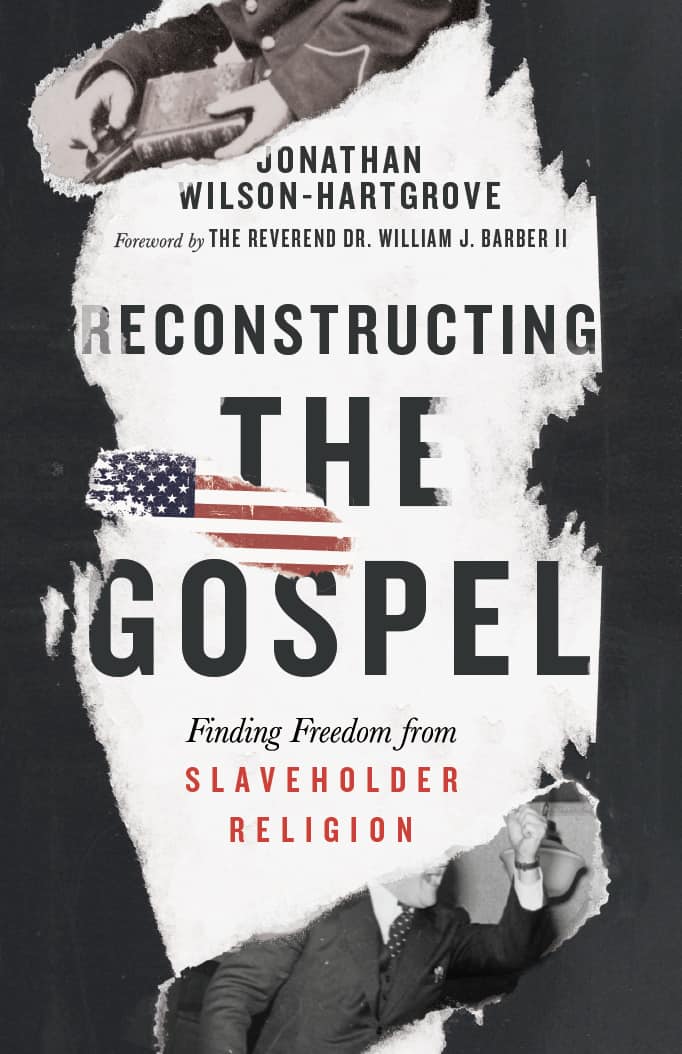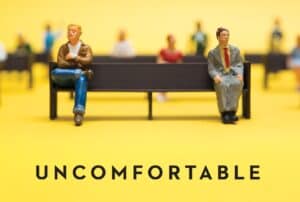
American Christians in the Obama years half hoped we’d moved beyond race. Yes, the Civil Rights Movement was a moral cause, we told ourselves. But we have moved beyond that now. We took down the Whites Only signs, integrated the schools, and saw a black man rise to this nation’s highest office. “Today’s justice issue isn’t race, but class,” some said. Others were even more dismissive: “African Americans need to stop blaming others and take responsibility for the problems in their communities.”
Yet, even as President Obama was in office, “their” communities were gentrified. Young white professionals moved back to urban centers, bringing with them the very American assumption that whoever owns the property owns the neighborhood. When new neighbors were frightened by hoodie-wearing “natives” in New York, Baltimore, Oakland, and Detroit, these suburban natives called the cops. Integrated police forces were deputized to defend the property rights of the new colonizers against black and brown neighbors they’d learned to fear by watching shows like Cops.
And we thought we’d left race behind?
Young people of color who were tired of being stopped, frisked, and shot dead in the only place they’d ever called home found one another on Twitter and united around a hashtag three black women were using to raise a cry for racial justice: #BlackLivesMatter. When they occupied their cities’ streets after the deaths of Mike Brown, Eric Garner, Tamir Rice, Freddie Gray, and Sandra Bland, they became a movement and connected with veterans of the black-led freedom struggle who helped them see how their fight was but another link in a long chain. “All lives won’t matter until black lives matter,” they said. And they invited me and others to join them in this fight for a more perfect union.
Robert, a young man who’s led the Black Lives Matter movement in Durham, called to ask if I’d help him recruit some kids to see Ava DuVernay’s movie Selma about the fight for voting rights in Alabama in 1965. We found a hundred young people to view the movie together on opening night. As the credits rolled at the end, Robert stood at the front of the theater and declared, “The same fight they were fighting then, we’re fighting now!” He led about forty young people into the hallway, where they lay down for four minutes of silence to memorialize the four hours Michael Brown’s body was left lying in the street in Ferguson, Missouri.
A few weeks later, Robert called to tell me he was running for city council. I invited him to make my office his campaign headquarters, and over the next several months I watched middle schoolers who’d joined the “die-in” at the movie theater learn how to work a phone bank to raise money for a campaign and get out the vote. Robert won the primary race, and I saw hope dance in those kids’ eyes. When he lost in November, their spirits weren’t crushed. “I’m going to put the experience on my résumé,” Isaiah told me. Black Lives Matter had helped him to see that he was somebody in a way that no Bible study or afterschool tutor ever had.
How, I asked myself, had I missed it? In all of my genuine concern for these kids whom I’ve known and cared about since they were born, how had I failed to see that the healing and hope Jesus most wants to give them can’t be separated from a prophetic truth telling that confronts the systemic injustices they feel weighing on their bodies? What kept me from seeing this gospel?
In all of my genuine concern for these kids whom I’ve known and cared about since they were born, how had I failed to see that the healing and hope Jesus most wants to give them can’t be separated from a prophetic truth telling that confronts the systemic injustices they feel weighing on their bodies?
I thought about the Colfax Courthouse and Strom Thurmond and all the subtle ways I had learned to imagine my Christian duty as a call to subdue the dangerous inner city and “redeem America” from the problems that we too easily associate with blackness. No, I wasn’t a conscious white supremacist. I didn’t have Klan robes hidden in my closet. But for far too long something had kept me from seeing the essential connection between a young black man’s spiritual growth and the possibility of political power and cultural imagination that Black Lives Matter offered. Even in Obama’s America, I was practicing a racially fragmented faith.
And I wasn’t by any means alone. During the campaign of 2016, I watched news coverage of a campaign rally in Fayetteville, North Carolina, where thousands gathered to cheer Donald Trump’s promise to “Make America Great Again.” It was, I noticed during the camera pan, an overwhelmingly white crowd. But there, amidst the sea of people, a Black Lives Matter activist stood to object. He didn’t hear the hope of better economic times that his white neighbors cheered. He heard old hatred and fear. He heard the ringing endorsements of the KKK, and he knew that Trump’s crusade against Obama’s citizenship had not been about a birth certificate—it had been about the imagined danger of a black man in the White House.
“Get ’im outta here!” Trump shouted. Security officers cuffed the Black Lives Matter activist’s hands before leading him through a jeering crowd. Somewhere in the mayhem, an older white man punched the young black man in the face.
I thought of Robert’s “die-in” on the theater’s carpet. I thought about those young guys calling from a phone bank to tell people they’d never met about Robert’s vision for One Durham. Where Trump and his supporters saw a menace to society, I saw Jesus. The same Jesus who’d breathed hope into kids I love took a beating on national television and was locked up.
Months later, when 81 percent of white evangelicals told exit pollsters that they voted for Donald Trump, I was sad. But I could not be surprised. A son of the South, I inherited a white identity that knew how to worship Jesus on Easter Sunday morning and stamp out “Negro rule” in the afternoon. Our dead are buried among monuments that praise the “Christian virtue” of slaveholders. We sing “Amazing Grace”—that anthem written by a repentant former slave-ship captain—in spaces where grace has been hijacked by a way of life rooted in every one of the seven deadly sins. No, I have no room to judge. I can only confess.
But this confession that my life is entangled in my country’s original sin of race-based slavery grows out of a grace—the gift of Black Lives Matter to Isaiah and to me. Karl Barth said we only know sin on our way out. He was echoing Augustine. To confess is also to announce that you’ve seen something new. It is to name, as best as I know how, how the Jesus of Black Lives Matter is saving me from the Jesus of Colfax Courthouse. More and more I realize that reconstructing the gospel is, first and foremost, about knowing which Jesus we follow.
Reconstructing the gospel is, first and foremost, about knowing which Jesus we follow.
After Frederick Douglass recounted the horrors of living as chattel and the drama of his fight for freedom in what would become the nineteenth century’s most famous description of slavery, the reality of multiple Christs haunting the South emerged as the subject of an appendix to his autobiography. He did not need the epiphany I would experience over a century and a half later in an Episcopal church. He knew from experience that Jesus had been split in two. But he also didn’t want to be misunderstood. Douglass knew and trusted Jesus. He wanted a reconstructed gospel to save him and his country.
“I find, since reading over the foregoing Narrative,” Douglass wrote, “that I have, in several instances, spoken in such a tone and manner, respecting religion, as may possibly lead those unacquainted with my religious views to suppose me an opponent of all religion.” The formerly enslaved Douglass had exposed the hypocrisy of his Christian slavemaster and a Christian society that would defend the master’s right to hold people as property. He’d exposed the sin and inhumanity of slavery by simply telling his story.
But Douglass’s experience begged a distinction—a point of clarification amidst dizzying self-deception. Though he had rebelled against the teachings of the slaveholders’ religion (think: “Slaves, obey . . . your masters” [Ephesians 6:5]), Douglass found a life-giving message of freedom in the teachings of Jesus. His experience of divine grace taught him the difference between, as he said it, “the Christianity of this land, and the Christianity of Christ.”
To be the friend of the one, is of necessity to be the enemy of the other. I love the pure, peaceable, and impartial Christianity of Christ: I therefore hate the corrupt, slaveholding, women-whipping, cradle-plundering, partial and hypocritical Christianity of this land.
American Christianity does not need an Edward Snowden to leak classified information to muckrakers who will tell all in a sensational exposé. Our junk is out there. It has been for some time. Our missionaries were on the slave ships; our endowments were built up by stolen labor. We split denominations to support the Confederacy, blessed a violent Redemption movement, defended Jim Crow, fretted that civil-rights preachers had forsaken their “spiritual” calling, and cooperated in the criminalization of people of color, all the while exporting our religion with zeal. Rwanda, widely celebrated in American churches as the most evangelized nation in Africa, erupted in violence during the spring of 1994. Nearly a million people were massacred by neighbors who’d learned from Christian missionaries the “essential” racial difference between Hutus and Tutsis. Rwanda’s genocide began on Thursday of Easter Week. The ghosts of Colfax Courthouse haunt the streets of the Rwandan capital, Kigali.
Such contradictions have not gone unnoticed. They drive the exponential growth of those who, when asked for their religious affiliation, choose “none.” (According to the most recent Pew Center data, that’s a quarter of all Americans, and over a third of those under the age of thirty-five).
Why are millennials choosing to part ways with the faith of their parents? No doubt the reasons are many and complex. But one clear factor in the decline of white Christianity is a prevailing sense that Christians are more likely to be racist, homophobic, self-righteous, and blindly patriotic. Not just in the past. And not just in the South. This is the lived experience of twenty first- century Americans. Theirs is not an angry rebellion against conservative values. It simply seems to them that the Christianity of this land makes people worse.
I get it. Self-righteousness sucks. And we have, all of us, inherited a mess. I don’t for a minute blame those who’ve set out to find a better way, retreated to what seem like safer spaces, or otherwise sought to distance themselves from organized religion. I know how nasty we Christians can be.
But I also keep getting interrupted by Jesus. Twenty years ago, on a sidewalk in Washington, DC, I heard the Jesus who has been interrupting the Christianity of this land since the first slave ships arrived at Jamestown. He was a stranger to me, yet he spoke a language I knew in words I’d committed to memory. Following him hasn’t meant leaving foggy mornings behind. I know this Jesus and love him. But I failed to recognize him right here in my neighborhood for years. Still, the Jesus whom Frederick Douglass trusted doesn’t give up on someone like me. This Jesus hasn’t given up on any of us. This Jesus finds us in our self-deception and interrupts us. He invites us to follow him into a whole new world.
Jonathan Wilson-Hartgrove (MDiv, Duke Divinity School) is a writer, speaker, and activist. He and his wife, Leah, founded the Rutba House, a house of hospitality where the formerly homeless are welcomed into a community that eats, prays, and shares life together. Jonathan directs the School for Conversion, a nonprofit that pursues beloved community with kids in the neighborhood, through classes in North Carolina prisons, and in community-based education around the country. Jonathan is also an associate minister at the historically black St. John’s Missionary Baptist Church. This excerpt is taken from Reconstructing the Gospel: Finding Freedom from Slaveholder Religion copyright (c) 2018 by Jonathan Wilson-Hartgrove. Published by InterVarsity Press, Downers Grove, IL. Used with permission.



One Response